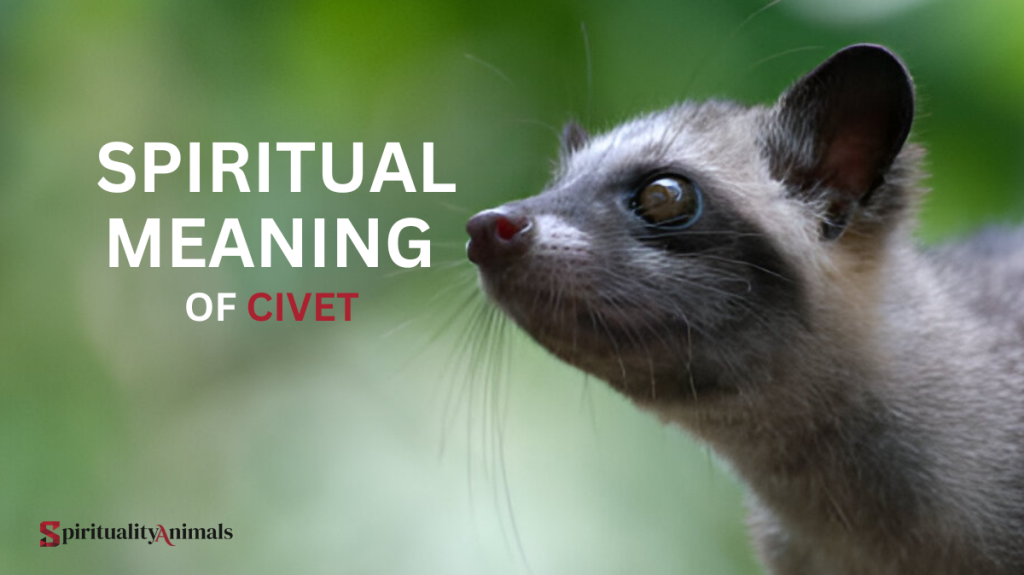When we look at animals in nature, they often carry special meanings that go beyond what we see. The civet, a small mammal that lives mostly in Africa and Asia, has its own unique spiritual story to tell.
Many people don’t know much about civets, but these animals have played important roles in different cultures throughout history. They have special qualities that can teach us valuable lessons about life and spirituality.
We will explore what the civet means in a spiritual sense and why some people feel connected to this mysterious animal as a spirit guide.

Contents
- 1 Brief Answer on Spiritual Meaning of Civet
- 2 Overview of Civet Symbolism
- 3 Importance of Civet in Spirituality
- 4 Meaning and Messages of the Civet Spirit Animal
- 5 Types of Civet and their Meaning
- 6 Historical Context of Civets
- 7 Spiritual Signs Linked to the Civet
- 8 Spiritual Characteristics of the Civet
- 9 Symbolism of Civet in Different Cultures
- 10 Positive Traits of the Civet
- 11 Negative Traits of the Civet
- 12 Lessons from the Civet Spirit Animal
- 13 Power Animal: The Civet
- 14 Conclusion
- 15 Frequently Asked Questions
Brief Answer on Spiritual Meaning of Civet
The primary spiritual meaning of the civet is that of a protector and a symbol of wealth and good fortune. It is often seen as a guardian that wards off evil spirits while also attracting prosperity and luck.
Overview of Civet Symbolism
Civets are known for being quiet, careful, and good at adapting to their surroundings. In the spiritual world, they often stand for secrets, night wisdom, and finding your way in dark times.
These cat-like creatures are mainly active at night, which connects them to the moon and its mysteries. Just like how civets can see in the dark, they symbolize the ability to see what others cannot to understand hidden truths and find paths that might not be obvious to everyone else.
Importance of Civet in Spirituality
In spiritual practices, animals are often seen as messengers that bring wisdom from nature. The civet holds a special place because it walks between worlds not fully a cat and not fully something else.
This in-between nature makes the civet a guide for people going through big changes or feeling caught between different parts of their lives.
The civet teaches us about balance, adaptation, and finding our own unique path rather than following what everyone else does.
Meaning and Messages of the Civet Spirit Animal
What Does the Civet Represent Spiritually?
Spiritually, the civet represents several important qualities. First, it stands for independence civets are solitary animals that take care of themselves.
Second, it symbolizes resourcefulness, as these animals can find food and shelter in many different environments.
Third, the civet represents intuition and keen senses, as they rely on their sharp hearing and smell to navigate the world, especially at night.
The civet also teaches us about using what we have in creative ways. In nature, civets are known for their special scent glands, which they use for marking territory and communication.
This reminds us that even things that might seem strange or different about us can be valuable tools when used in the right way.
Messages from the Civet
When the civet appears as a spirit animal, it often brings these messages:
Trust your instincts when making decisions. Just as the civet uses its senses to find food and avoid danger, you should listen to your inner voice.
Take time for yourself. Civets value their alone time, which helps them stay centered and focused. This teaches us that solitude can be healing.
Adapt to change instead of fighting it. Civets live in many different habitats and can adjust their diets based on what’s available. This flexibility helps them survive and thrive.
Look beyond what’s obvious. Civets see in low light, reminding us to look deeper than surface appearances to find truth.
Types of Civet and their Meaning
Masked Palm Civet
The masked palm civet, with its distinctive face markings, represents the idea of wearing different “masks” in life. This teaches us about knowing when to show different sides of ourselves while staying true to who we really are inside.
These civets are excellent climbers, symbolizing the ability to rise above problems and gain a better perspective.
African Civet
The African civet is known for its beautiful spotted coat. Spiritually, it represents the beauty that can come from embracing our unique patterns and differences.
These civets are larger and more confident, symbolizing strength in standing out rather than blending in. Their bold markings remind us that what makes us different also makes us special.
Viverra
Civets in the Viverra family are known for their elegant movements. They teach us about moving through life with grace even during difficult times. These civets represent dignity and poise when facing challenges.
Paradoxurus
These “palm civets” are tree-dwellers, spiritually representing higher thinking and the ability to see the bigger picture. They remind us to look at life from different angles before making judgments.
Otter Civet
The rare otter civet combines traits of both animals, teaching us about finding balance between playfulness and serious work. They show us how to adapt to different environments both land and water symbolizing emotional flexibility.
Malabar Large-Spotted Civet
This endangered civet carries a message about valuing what’s rare and protecting what’s vulnerable. Spiritually, they remind us that some of the most precious things in life need extra care and attention.
African Palm Civet
Known for their fruit-eating habits, these civets symbolize abundance and the sweet rewards that come from patience. They teach us to look for the “fruits” of our efforts and to appreciate nature’s gifts.
Civettictis
This genus of civets is known for their strength and resilience. They represent the power of survival and adaptability in challenging environments. Their message is about finding inner strength when facing obstacles.

Historical Context of Civets
Civet in Ancient Times
In ancient times, civets were highly valued for the musk they produce. In Egypt, this musk was used in perfumes and was considered almost magical.
The Egyptians saw civets as connected to their gods, especially those associated with secrets and protection. In China and other parts of Asia, civet musk was used in medicine and was thought to have healing powers.
Some ancient cultures believed that civets could see spirits or detect supernatural beings. Because of their night activity and glowing eyes in the dark, they were sometimes thought to be messengers between our world and the spirit world.
Cultural Importance Over Time
Throughout history, the civet has played different roles in human society. In trade routes across Africa and Asia, civet musk was as valuable as gold in some places. Merchants who traded in civet products often became wealthy and powerful.
In some African traditions, the civet was seen as a symbol of wisdom because of its careful, thoughtful movements and its ability to avoid predators. Stories were told about how the civet outsmarted larger animals using its cleverness rather than strength.
In parts of Southeast Asia, civets became important in coffee production. The special coffee made from beans that civets eat and then pass through their digestive system became one of the most expensive drinks in the world. This shows how the civet has influenced human culture in unexpected ways.
Spiritual Signs Linked to the Civet
Signs That the Civet is Your Spirit Animal
You might have the civet as your spirit animal if:
- You feel most alive and creative during the night hours.
- You value your privacy and need alone time to recharge.
- You notice small details that others miss.
- You prefer to solve problems by thinking carefully rather than taking quick action.
- You’re good at keeping secrets and people trust you with their private thoughts.
- You function well in different social groups but don’t feel like you fully belong to any of them.
What Does It Mean If You Keep Seeing a Civet?
If civets keep appearing in your life whether in dreams, images, or unusual encounters it might be sending you messages:
- It might be time to look more closely at a situation that isn’t what it seems.
- You may need to trust your senses more than what others are telling you.
- There could be an opportunity coming that requires you to adapt to new circumstances.
- You might need to pay attention to a talent or ability you’ve been ignoring.
The civet might be encouraging you to embrace your unique qualities instead of trying to fit in.
Spiritual Characteristics of the Civet
Main Traits of the Civet Spirit Animal
The civet spirit animal carries these key spiritual traits:
Discretion: Civets are cautious and selective about when to reveal themselves, teaching us about the power of knowing when to speak and when to stay quiet.
Balance: They walk a middle path between different animal families, showing us how to find harmony between opposing forces in our lives.
Resourcefulness: Civets make use of whatever their environment provides, teaching us to work with what we have rather than focusing on what we lack.
Sensory wisdom: With their heightened senses, civets remind us to use all our ways of knowing not just our logical minds, but also our intuition and physical senses.
How the Civet Inspires Us Spiritually
The civet inspires us to:
- Find our own spiritual path even if it doesn’t fit with mainstream practices.
- Trust what we feel and sense even when we can’t explain it logically.
- Use our unique gifts, even if they seem strange to others.
- Move quietly and thoughtfully through life, observing before acting.
- Value both solitude and connection, finding a balance that works for us.
Symbolism of Civet in Different Cultures
Civet in Eastern Cultures
In many Asian cultures, the civet holds special meaning. In China, civets are sometimes seen as symbols of good fortune, especially in business. Their ability to find rare and valuable foods in the forest connects them to prosperity.
In India, some communities view the civet as a symbol of the balance between wild nature and human settlements, as these animals adapt to living near people while maintaining their independence.
In Indonesian and Malaysian folklore, civets are often characters in stories about cleverness and outwitting opponents through quick thinking rather than physical strength.
Civet in Western Cultures
In Western cultures, civets aren’t as well-known, but they’ve still influenced society, especially through the perfume industry. For centuries, civet musk was a key ingredient in the most expensive perfumes, giving the animal an association with luxury and exclusivity.
In some African traditions that influenced Western spiritual practices, civets are seen as protectors against negative energies because of their strong territorial nature and their distinctive scent marking.

Positive Traits of the Civet
Wisdom and Independence
The civet teaches us about the wisdom that comes from being comfortable alone. Unlike animals that depend on large groups for survival, civets make their own decisions and follow their own paths.
This independence reminds us that sometimes the best answers come when we step away from the crowd and listen to our own inner voice.
Resourcefulness
Civets are incredibly adaptable eaters, finding food in many different places. This resourcefulness teaches us to look for solutions in unexpected places and to make good use of whatever resources we have available.
The civet spirit encourages creative problem-solving rather than giving up when the obvious path is blocked.
Silent Strength
Rather than roaring like a lion or howling like a wolf, the civet moves quietly through the world. This silent strength reminds us that real power often doesn’t need to announce itself loudly.
The civet spirit animal teaches us that confidence can be quiet, and that listening often accomplishes more than speaking.
Negative Traits of the Civet
Over-Reliance on Seclusion
While independence is a strength, the civet can also teach us about its shadow side. Sometimes civets become too solitary, missing the benefits that come from community and shared knowledge.
The civet spirit animal reminds us to find balance between alone time and connection with others.
Fear of Change
Despite their adaptability, civets are creatures of habit who prefer familiar territories. This can sometimes manifest as resistance to necessary changes or staying too long in comfortable but limiting situations.
The civet teaches us to recognize when our desire for security is preventing needed growth.
Lessons from the Civet Spirit Animal
Embrace Silence and Solitude
One of the most important lessons from the civet is the value of quiet time. In today’s noisy world, the civet reminds us that silence is not empty it’s full of wisdom and healing if we learn to listen.
Setting aside time for quiet reflection helps us hear our inner guidance more clearly.
Be Adaptable
Civets survive in many different environments by adjusting their behavior. This teaches us to be flexible when circumstances change, looking for new opportunities rather than clinging to old ways that no longer serve us.
The civet shows us that adaptability is not just about survival it’s about finding new paths to thrive.
Trust Your Intuition
With their keen senses, civets perceive things that others miss. This reminds us to trust our own instincts and subtle feelings.
Sometimes we know things without knowing how we know them the civet encourages us to value these intuitive insights as much as logical reasoning.
Power Animal: The Civet
What Does It Mean to Have the Civet as Your Power Animal?
When the civet serves as your power animal, it lends you its special energies when you need them most. You can call on civet energy when:
- You need to see beyond surface appearances to understand a complicated situation.
- You’re facing a big change and need help adapting.
- You need to protect your boundaries and personal space.
- You want to sharpen your intuition and trust your inner guidance.
Having the civet as a power animal means you can draw on its gifts of perception, adaptability, and quiet wisdom. It helps you find your way through confusing times by enhancing your ability to sense what’s really happening beneath the surface.
Conclusion
The civet spirit animal offers us many valuable lessons about living in balance with ourselves and the world around us.
From its independent nature to its keen senses, the civet teaches us to value our uniqueness, trust our intuition, and find our own path even when it’s different from what others expect.
Whether you feel drawn to the civet as a spirit guide or simply find its qualities inspiring, this special animal reminds us that sometimes the most powerful wisdom comes from the quiet, overlooked corners of nature.
By embracing the civet’s spiritual meaning, we can learn to move through life with greater awareness, adaptability, and inner confidence.
Frequently Asked Questions
What does it mean if I dream about a civet?
Dreaming about a civet often suggests you’re becoming more aware of hidden aspects of a situation or of yourself. It might indicate that you need to pay attention to subtle cues or trust your intuition about something important.
Can anyone have the civet as their spirit animal?
Yes, spirit animals choose us based on what lessons we need to learn, not on where we live or what animals we’ve encountered physically. If you feel drawn to the civet’s energy and teachings, it may well be working with you as a spirit guide.
How can I connect more deeply with civet energy?
You can strengthen your connection with civet energy through meditation, by learning more about these animals in nature, or by keeping images of civets in your personal space. Spending time in nature during twilight hours when civets are active can also help you feel their energy.
Are there any crystals associated with civet energy?
While there’s no “official” civet crystal, stones that enhance intuition and night vision like moonstone, labradorite, and amethyst work well with civet energy. These stones support the civet’s gifts of perception and inner knowing.
How is the civet different from other cat-like spirit animals?
Unlike true cats, the civet represents a middle path it shares qualities with many animal families but belongs completely to none of them.
Disclaimer: At SpiritualityAnimals, we share spiritual and symbolic interpretations based on traditional wisdom and personal insights. Our content is purely informational and should not replace professional guidance.
